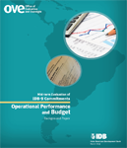IDB-9: Operational Performance and Budget
Date
Mar 2013
In IDB-9 the Board of Governors of the Inter-American Development Bank (IDB) mandated the adoption of a results-based budgeting process (RBB) that would be aligned to and would help achieve the key performance targets of the Corporate Results Framework (CRF), as well as improve accountability and transparency. In addition, they mandated the use of a Balanced Score Card Performance Management System (BSC) that would incorporate the results from an External Feedback System (EFS). The Governors also requested that the Bank continue its efforts to improve organizational efficiency. The IDB has made significant progress in improving the quality and availability of information related to the budget and the associated work program, and in developing and enhancing the systems to support the budget planning and monitoring process. Many of the actions defined in the RBB Framework document can be considered complete from a technical perspective, but the RBB is still a work in process. One major area that RBB planners underestimated was the effort and time it would take to create an organization that uses data to manage for results. This effort must involve all levels of Management and be accompanied by appropriate incentives. Work on this cultural change has started but will extend beyond the planned three-year RBB implementation period. The BSC effort resulted in organizational learning and the development of a number of performance indicators, but it failed to achieve its objective of implementing a BSC that would provide the Bank with a Strategic Planning and Management system to help ensure the alignment of business activities with organizational strategy and provide a focused, comprehensive perspective of the Bank¿s organizational performance.The EFS is just being restarted, and preliminary results are expected in early 2013. Work is under way to improve operational efficiency, but the RBB data provide limited support to this activity, as most of the efficiency indicators are related to cycle times and not budget. OVE provides several suggestions for future work: (i) increase the focus, attention, and resources devoted to the RBB change management process to help achieve the culture change needed to create an organization that "manages for results"; (ii) plan for the involvement of all levels of Management, use internal and external experts in this process, and recognize that the process will take time; (iii) with Human Resources, create and implement incentives to recognize and reward behavior and good practices that can change the Bank¿s culture; (iv) consider raising the sponsorship level of the RBB, possibly combining it with the Program Optima governance structure; (v) focus on creating a limited set of performance indicators that drive the Bank¿s business and that link to its strategy, objectives and priorities; and (vi) reexamine the budget process to identify key constraints (for example, the head count ceiling) and reexamine the timing of performance reporting and budget allocations/reallocations to ensure alignment.



